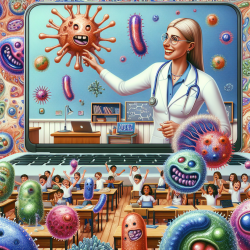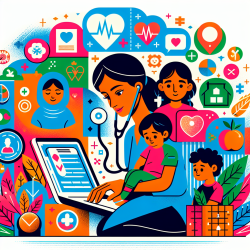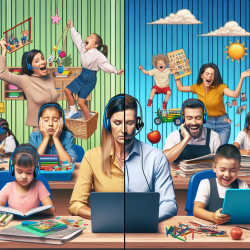Introduction
The COVID-19 pandemic has reshaped many aspects of education and therapy, introducing unique challenges but also opportunities for innovation. The research article "Teaching with Microbes: Lessons from Fermentation during a Pandemic" by Megan A. Carney offers insights that can be applied to enhance online therapy services, such as those provided by TinyEYE. By understanding the microbial lessons and their broader implications, practitioners can improve their skills and create better outcomes for children in online therapy settings.
Understanding Microbial Lessons
The research highlights the transformative power of microbes in teaching and learning environments. During the pandemic, students shifted from a simplistic understanding of microbes to a more nuanced appreciation of their role in human health and society. This shift was facilitated through hands-on experiments with fermentation, which allowed students to engage with the material in a tangible way.
For practitioners in speech-language pathology, this approach underscores the importance of interactive and experiential learning. By incorporating similar methods into online therapy, therapists can foster a deeper understanding and engagement among children. This can be achieved through interactive activities that simulate real-world experiences, even in a virtual environment.
Applying Microbial Insights to Online Therapy
The concept of microbiopolitics, as discussed in the article, emphasizes the interconnectedness of social, political, and biological systems. In the context of online therapy, this perspective can be used to address the diverse needs of children from different backgrounds. By considering the social and environmental factors that influence a child's learning and development, therapists can tailor their approaches to be more inclusive and effective.
Moreover, the research suggests that thinking with microbes is not a neutral process. It is shaped by various dynamics, which can be paralleled in the therapy setting. Practitioners should be aware of the power dynamics and patterns of inequality that may affect a child's access to therapy and learning opportunities. By addressing these issues, therapists can contribute to more equitable outcomes for all children.
Encouraging Further Research and Innovation
The lessons from fermentation during the pandemic serve as a reminder of the potential for innovation in therapy practices. Practitioners are encouraged to explore further research on the role of microbes and other biological processes in learning and development. This can lead to the development of new strategies and tools that enhance the effectiveness of online therapy.
By staying informed about the latest research and being open to new ideas, therapists can continue to improve their skills and provide better services to children. Collaboration with researchers and other professionals in the field can also foster a more comprehensive understanding of the factors that influence therapy outcomes.
Conclusion
The research article "Teaching with Microbes: Lessons from Fermentation during a Pandemic" offers valuable insights that can be applied to online therapy practices. By embracing the lessons of microbial interactions and their broader implications, practitioners can enhance their skills and create better outcomes for children. To read the original research paper, please follow this link: Teaching with Microbes: Lessons from Fermentation during a Pandemic.










